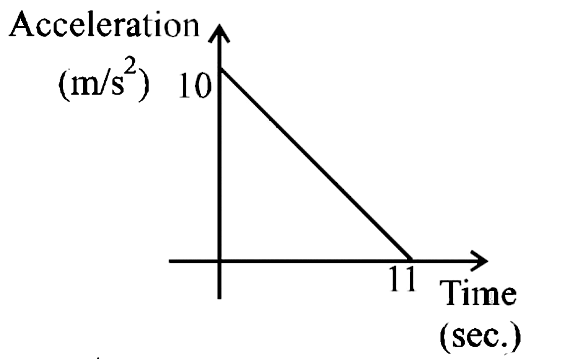A body is projected at time t=0 from a certain point on a planet's surface with a certain velocity at a certain angle with the planet's surface (assumed horizontal). The horizontal and vertical displacement x and y (in metre) respectively vary with time t in second as, x=(10√3)tandy=10t−t2. The maximum height in meter attained by the body is
100 m
75 m
50 m
25 m.
The correct Answer is:D
(ymax)⇒dydt=0
⇒ddt(10t−t2)=10−2t ⇒t=5
⇒ ymax=10(5)−52=25m
Topper's Solved these Questions
- MOTION IN A PLANE BOOK - PHYSICS WALLAHCHAPTER - MOTION IN A PLANE EXERCISE - NEET Past 5 years Questions
10 Videos
- MOTION IN A PLANE BOOK - PHYSICS WALLAHCHAPTER - MOTION IN A PLANE EXERCISE - NEET Past 5 years Questions
10 Videos
- MECHANICAL PROPERTIES OF MATTERBOOK - PHYSICS WALLAHCHAPTER - MECHANICAL PROPERTIES OF MATTEREXERCISE - NEET Past 5 Yeats Questions
16 Videos
- MOTION IN A STRAIGHT LINEBOOK - PHYSICS WALLAHCHAPTER - MOTION IN A STRAIGHT LINEEXERCISE - NEET Past 5 Years Questions
5 Videos
Similar Questions
A body is projected at time t=0 from a certain point on a planet's surface with a certain velocity at a certain angle with the planet's surface (assumed horizontal). The horizontal and vertical displacement x and y (in metre) respectively vary with time t in second as, x=(10√3)tandy=10t−t2. The maximum height in meter attained by the body is
View SolutionThe horizontal and vertical displacements of a projectile at time t are x=36t and y=48t−4.9t2 respectively where x ,y are in meters and t in seconds.Initial velocity of the projectile in m/s is
View Solution
Knowledge Check
A body is projected at time t = 0 from a certain point on a planet’s surface with a certain velocity at a certain angle with the planet’s surface (assumed horizontal). The horizontal and vertical displacements x and y (in meters) respectively vary with time t (in second) as x=10√3t,y=10t−t2
What is the magnitude and direction of the velocity with which the body is projected ?A20ms−1 at an angle of 30∘ with the horizontalB20ms−1 at an angle 60∘ with the horizontalC10ms−1 at an angle of 30∘ with the horizontalD10ms−1 at an angle of 60∘ with horizontalA body is projected at time t=0 from a certain point on a planet's surface with a certain velocity at a certain angle with the planet's surface (assumed horizontal). The horizontal and vertical displacement x and y (in metre) respectively vary with time t in second as, x=(10√3)tandy=10t−t2. The maximum height attained by the body is
A100 mB75 mC50 mD25 mA body is projected at time t=0 from a certain point on a planet's surface with a certain velocity at a certain angle with the planet's surface (assumed horizontal). The horizontal and vertical displacement x and y (in metre) respectively vary with time t in second as, x=(10√3)tandy=10t−t2. The maximum height in meter attained by the body is
A100 mB75 mC50 mD25 m.
The horizontal and vertical displacements x and y of a projectile at a given time t are given by x=6tandy=8t−5t2 meter.The range of the projectile in metre is:
View SolutionThe displacement y (in metre) of a body varies with time t (in seconds) as y=−23t216t+2. The body comes to rest in a time
View SolutionThe displacement y (in metres) of a body varies with time t ( in seconds ) as y=−23t2+16t−12 . How long does the body take to come to rest ?
View SolutionA body starts from rest at time t=0 , the acceleration time graph is shown in the figure . The maximum velocity attained by the body will be

View SolutionThe horizontal and vertical displacements of a particle moving along a curved line are given by x=5tandy=2t2+t. Time after which its velocity vector makes an angle of 45∘ with the horizontal is
View Solution
